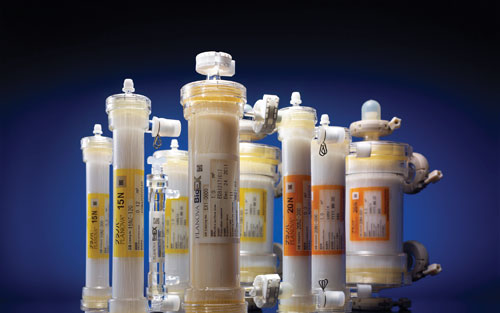October 1, 2012 (Vol. 32, No. 17)
Downstream Bioprocessing Industry Leader Backed by Planova™ Virus-Removal Filters
Asahi Kasei Bioprocess (AKB) provides pharmaceutical and biopharmaceutical manufacturers with a comprehensive suite of tools to maximize safety and improve yields of biotherapeutics during pilot, clinical, and commercial-scale production.
Virus filtration has been AKB’s strength since 1989 when Planova became the world’s first virus-removal filter for biological products and plasma derivatives. Other areas of expertise include impurity removal, liquid chromatography, inline buffer dilution, and oligosynthesis.
Global headquarters are located in Tokyo, Japan as the Bioprocess Division of Asahi Kasei Medical Co. In Glenview, IL, a 2,300 m2 facility supports equipment manufacturing and R&D. Asahi Kasei Bioprocess Europe in Belgium and Germany distributes bioprocess products and offers seminars and hands-on training to customers. Offices in Singapore and China also support AKB’s market development.

Revolutionizing Virus Filtration with Planova
Planova 15N, 20N, 35N, and 75N virus-removal filters operate by size exclusion and are available in four nominal pore sizes: 15 nm, 19 nm, 35 nm, and 72 nm, respectively. Viruses become trapped in the interconnected network of void and capillary pores present in hollow-fiber membrane walls. This robust virus-removal mechanism allows virus to be retained while maximizing protein yield, as product is not adsorbed.
Process scale-up is simplified because Planova filters are available in surface area sizes from 0.001 m2 to 4.0 m2 with the same standardized hollow-fiber format. Following Planova filtration, mandatory post-use integrity testing is expedited using the automated Asahi Gold Particle Test System (AGPTS).
For filtrations involving high protein concentrations and higher pressures, Planova BioEX is ideal. Made of polyvinylidene fluoride (PVDF), Planova BioEX combines the reliable performance and scalability of Planova filters with a simplified and sensitive integrity test. All Planova filters are compatible with the new Virus Filtration Controller (VFC). Since floor space in manufacturing facilities is limited, the VFC provides consistent, automated virus removal in a compact footprint.

Overcoming Purification Bottlenecks
Other applications of hollow fiber technology include BioOptimal™ MF-SL, a microfilter for cell culture clarification, and the QyuSpeed™ D anion exchange membrane adsorber.
BioOptimal MF-SL combines size exclusion with tangential flow filtration to facilitate rapid processing of large volumes. Cells are gently separated from proteins to minimize cell-derived impurities.
In contrast, DEA ligands attached to grafted chains allow QyuSpeed D to bind negatively charged impurities regardless of flow rates and with relative insensitivity to salt concentrations. High binding capacity, reusability, and an economical alternative to column packing represent additional benefits.
AKB has also launched the TechniPur™ agarose family of chromatography media. TechniPur agarose is a highly rigid base matrix optimized for protein purification. Novel cross-linking technology coupled with the proven reliability and chemical stability of agarose make TechniPur ideal for ion exchange (IEX), size exclusion (SEC), affinity and immobilized metal affinity (IMAC) chromatography.
Improving HPLC and Bioprocess Chromatography
Preparative and commercial-scale production requires instrumentation to accommodate complex separations. Knauer Preparative HPLC Systems feature a modular design that maximizes product yield in a minimal amount of time. Once a particular process enters clinical-scale production, HPLC columns and systems from AKB purify oligonucleotides, peptides, and small-molecule APIs. For separations that require finer resolution, UHPLC columns and systems operate under higher pressures with silicas as small as 5 μm in diameter.
Alternatively, Knauer BioLine Biochromatography columns offer flexible bed heights for medium and high-pressure applications involving monoclonal antibodies (mAbs) and proteins. Purification processes involving similarly large molecules can be performed using bioprocess columns and bioprocess chromatography skids manufactured by AKB.
Creating On-Demand Buffers
To expedite processing of increasingly larger protein-expression titers, IBD™ Inline Buffer Dilution Systems prepare 1X binary and ternary buffer blends from up to 20X salt solution concentrates. Process analytical technology (PAT) controls pH and conductivity simultaneously while the small footprint helps replace buffer tanks with disposable bags. When ready, resulting buffers are delivered to existing downstream processing equipment, such as bioprocessing chromatography systems, to accelerate capture, polishing, virus filtration, and fill/finish of biological products.
Synthesizing Therapeutic Oligonucleotides
Nearly 250 programs are under development for therapeutics such as antisense oligos and siRNAs. Furthermore, in 2011, approximately $400 million was invested within this niche.
To support such growth, AKB builds axial and static compression synthesis columns for clinical and commercial-scale manufacturing featuring adjustable bed heights and uniform flow distribution. Synthesis columns are paired with oligonucleotide synthesizers to regulate reagent delivery and monitor conductivity, UV, pressure, and density.
Asahi Kasei Bioprocess
1855 Elmdale Avenue Glenview, IL 60026
Phone: 800.865.4100
Website: www.ak-bio.com
Date Founded: 2010
Number of Employees: 45







